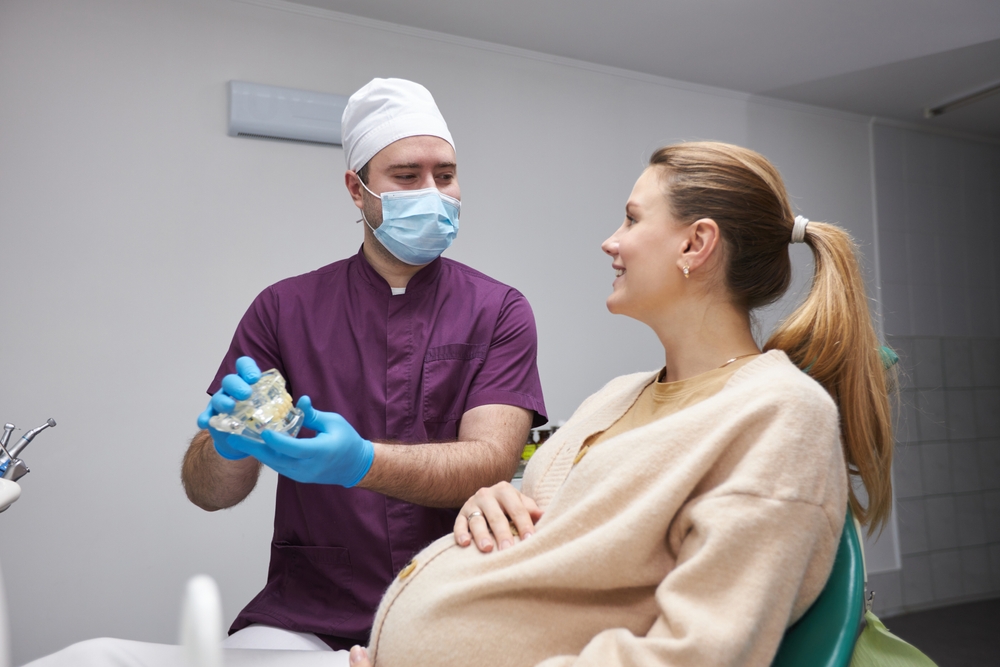Pregnancy is an exciting time, full of changes. As a baby grows inside a mother’s belly, the body undergoes many transformations. While many are familiar with common pregnancy changes, such as a growing belly and food cravings, not everyone is aware that pregnancy can also impact a mother’s oral health and teeth.
Let’s understand the relationship between dental issues and pregnancy and what expecting mothers can do to keep their smiles bright and healthy.
Changes in Hormones
During pregnancy, a woman’s body generates increased levels of hormones like estrogen and progesterone. These hormones are important for the baby’s development, but they can also cause changes in the mother’s mouth. One of the most common issues is swollen, tender gums, a condition called “pregnancy gingivitis.”
Gingivitis occurs due to heightened hormones that increase gum sensitivity to the bacteria found in plaque, the sticky film that accumulates on teeth. This can cause the gums to become red, swollen, and bleed, especially when brushing or flossing. It’s important to pay attention to these changes and maintain good oral hygiene to prevent gingivitis from turning into a more serious gum disease.
Increased Risk of Tooth Decay
Pregnant women might experience cravings for sweet or starchy foods, which can increase the risk of tooth decay. Eating more frequently, especially sugary snacks, can cause more acid to be produced in the mouth. This acid can wear away the enamel, the hard outer layer of teeth, leading to cavities.
Morning sickness, which includes nausea and vomiting, can also contribute to tooth decay. Vomit contains stomach acids that can be very harmful to the teeth. If a pregnant woman vomits frequently, these acids can erode the enamel, making teeth more vulnerable to decay.
To protect their teeth, pregnant women should rinse their mouths with water or fluoride mouthwash after vomiting and wait about 30 minutes before brushing to avoid scrubbing the acids into the enamel.
Dry Mouth
Some pregnant women may experience dry mouth, a condition known as xerostomia. Saliva is important because it helps wash away food particles and bacteria, keeping the mouth clean. When there isn’t enough saliva, it can lead to an increased risk of cavities and gum disease.
Drinking lots of water throughout the day can help fight dry mouth. Chewing sugarless gum or sucking on sugarless candies can also stimulate saliva production.
Tumours and Other Growths
In some cases, pregnant women might develop small, non-cancerous growths on their gums called “pregnancy tumours” or “pyogenic granulomas.” These growths can look scary, but they are usually harmless and often go away after the baby is born. However, if they cause discomfort or bleeding, it’s a good idea to see a dentist.
Maintaining Oral Health During Pregnancy
Maintaining dental care during pregnancy is very important for both the mother and the baby. Here are some excellent tips for ensuring good oral health:
- Brush and Floss Regularly: Brush your teeth with fluoride toothpaste at least twice a day and floss every day. This helps remove plaque and prevent gum disease and cavities.
- Visit the Dentist: Regular dental check-ups and cleanings are safe and important during pregnancy. Let your dentist know you are pregnant so they can provide the best care for you.
- Eat a Balanced Diet: Eating a variety of healthy foods helps keep your teeth and gums strong. Reduce the risk of tooth decay by limiting sugary snacks and drinks.
- Drink Plenty of Water: Staying hydrated helps keep your mouth moist and can wash away food particles and bacteria.
- Avoid Tobacco and Alcohol: These substances are harmful to both your oral health and your baby’s development.
- Manage Morning Sickness: If you experience morning sickness, rinse your mouth with water or a mouthwash after vomiting. To protect your enamel, avoid brushing your teeth immediately afterwards.
The Importance of Oral Health for the Baby
Maintaining good oral health during pregnancy is not just important for the mother; it can also affect the baby’s health. Research shows that gum disease in pregnant women can lead to premature birth and low birth weight. Bacteria from the mother’s mouth can enter the bloodstream and affect the baby’s development.
By keeping your mouth healthy, you are helping to ensure a healthy start for your baby. This means taking the time to brush and floss, eating nutritious foods, and seeing your dentist regularly.
Albany Dental is Your Healthcare Consultant During Pregnancy
Pregnancy is a special time filled with many changes. Understanding how these changes can affect your oral health is crucial for both you and your baby. By maintaining good oral hygiene habits, eating a balanced diet, and staying hydrated, you can help prevent dental problems and keep your smile healthy throughout your pregnancy.
Remember, a healthy mouth contributes to a healthy body, which is essential for the well-being of both mother and baby. If, during pregnancy, your mouth feels uncomfortable, don’t hesitate to consult our in-house dentist in Edmonton. Albany Dental provides specialized assistance to pregnant women facing dental issues through a gentle and precise approach.
